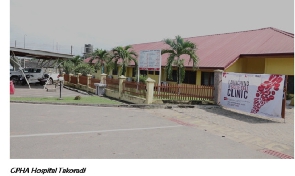Sickle cell disease (SCD) is a genetic disorder where red blood cells have an abnormal shape, causing various health issues. In Ghana, SCD is prevalent, with approximately 2-3% of the population carrying the sickle cell trait. Common challenges include pain crises, anemia, infections, and organ damage. Early diagnosis, managing symptoms, and promoting genetic counseling are crucial strategies in Ghana to address the impact of SCD.
In a bid to raise awareness about sickle cell disease, the GPHA Hospital-Takoradi launched a Sickle Cell Clinic dedicated to treating and managing this condition. To commemorate the event, the GPHA staff, the wider community, and individuals affected by sickle cell gathered at the Takoradi Port’s Senior Club House. Here, they engaged with presentations from experienced healthcare professionals, delving into insights on sickle cell, including current medications and treatment approaches.
In her opening address, the Human Resource Manager of Takoradi Port, Mrs. Agyeikuwa-Hammond emphasized that Sickle Cell goes beyond being merely a medical condition, as it profoundly impacts individuals and their families. She highlighted that this gathering served not only to recognize the struggles of those with sickle cell but also to honor their courage, tenacity, and resilience. Noting September as Sickle Cell Disease Awareness Month, she urged everyone to recognize the potency of knowledge in combating the disease.
Mrs. Agyeikuwa-Hammond stressed the importance of education, early detection, and access to quality healthcare in improving the lives of those with the condition. She underscored the collective influence of our combined efforts, regardless of our roles, in making a significant difference. Mrs. Agyeikuwa-Hammond encouraged fostering understanding, compassion, and unity in battling Sickle Cell Disorder, urging everyone to contribute to a future where its pain and challenges are no longer endured.
Eugene Donkor, a Sickle Cell patient, shared his journey, revealing that he discovered his condition during Junior High School, making him realize his uniqueness as compared to others. He recounted numerous hospitalizations during his childhood, shaping many of his memories around hospital experiences. Despite these challenges, he resolved not to allow the condition to define his potential. Eugene emphasized how Sickle Cell affects all aspects of a patient's life.
While acknowledging the condition's constraints, he firmly believed it shouldn't be viewed as a death sentence. He advocated for awareness of one's limitations and symptoms, asserting that with this understanding, patients can lead fulfilling lives. Eugene underscored the persistence of pain in their lives, alternating between moments of relief and sudden reminders of their distinctiveness. He highlighted the importance of adequate hydration and emphasized the importance of understanding one's limitations and having a robust support system.
Moreover, he urged patients to refrain from self-diagnosis and always seek professional medical consultation.
In an interview, Dr. Sheila Asamoah Okyere expressed her joy regarding the launch of the Sickle Cell Clinic at GPHA-Takoradi Hospital, as it will not only provide care for sickle cell patients but also raise awareness about the disease. She discussed the clinic’s new treatment approaches and highlighted the benefit of receiving medications to enhance their overall well-being.
Dr. Sheila foregrounded the importance of knowing one’s genotype, explaining that simply undergoing a sickling test will not detect the “C” genotype she urged everyone to undergo electrophoresis to make informed decisions, particularly when choosing life partners. Her key message emphasized the importance of preventing the disease by understanding our genotypes, given the challenges involved in caring for sickle cell patients.
GPHA Takoradi Hospital Administrator, Dr. Helen Tetteh emphasized the numerous benefits that the Sickle Cell Clinic brings to its clients. She stressed that Sickle Cell affects not only the patients but also their families. Having a dedicated place for education and treatment eases the burden on both patients and their families. Dr. Tetteh highlighted that the clinic serves as a support system, allowing patients to connect with others facing the same condition. Additionally, it enhances the hospital's services and accessibility to a wider audience.
Regarding genotype testing, Dr. Tetteh mentioned that it is an affordable and fast process. She acknowledged that the main challenge lies in the cost of medication, particularly the expensive hydroxyurea. However, she mentioned the government's health insurance scheme, which subsidizes the cost of this medication, making it accessible to the general public beyond GPHA staff and their dependents.
Dr. Tetteh also noted that GPHA Hospital faces the challenge of not having a blood bank, relying on external facilities, which can be problematic at times. In conclusion, she stressed the importance of genotype awareness, highlighting that Ghana witnesses about 200 sickle cell diagnoses daily, making it crucial for everyone to know their genotype for better life planning.
Belinda Oyo Quartey, a nurse at GPHA Hospital and a Sickle Cell patient herself, initiated the concept of establishing a Sickle Cell clinic in response to the lack of such facilities in the region. Recognizing the scarcity of resources for Sickle Cell patients and the complexities of the disease, she collaborated with fellow healthcare professionals to create this clinic.
On the issue of stigma, Belinda emphasized that Sickle Cell disease is not contagious; it is a genetic condition present from birth. She urged the public to show empathy and provide vital support to those affected by the condition. Furthermore, she advised healthcare providers to prioritize comprehensive care for Sickle Cell patients, particularly when they are in pain. She stressed the importance of not dismissing their discomfort and attending to their needs promptly.
Health News of Sunday, 24 September 2023
Source: Eye on Port

















